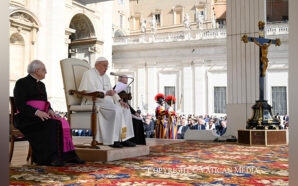Bernard McGinn has been writing and teaching about the history and theology of Christian mysticism for more than half a century, establishing himself as the foremost scholar in the field. Now an emeritus professor of historical theology, he is the author of twenty-three books and editor of thirteen more. And that doesn’t include his long-term editorship (1988–2015) of the now 134-volume library of the Classics of Western Spirituality published by Paulist Press, which is where I first came across his name.
Since 1969, McGinn has been teaching at the University of Chicago Divinity School, together with his friend from seminary days in New York, David Tracy. He has lectured at some two hundred universities in North America, South America, Europe, and Asia, and is a fellow of the American Academy of Arts and Sciences, among other scholarly organizations. McGinn’s wife of fifty years, Pat, is his editor and close collaborator, as well as a practicing psychotherapist.
This interview took place in their home in Hyde Park, Chicago, where his study sits on one side of the kitchen, and her counseling office sits on the other. The interview has been edited for length and clarity.
Kenneth L. Woodward: I want to frame my first question with a story. Many years ago I received a long letter from Graham Greene in response to a book I wrote about saints that included a short paragraph on the popular Italian mystic Padre Pio. Shortly after converting to Catholicism, Greene wrote, he went to Italy to observe Padre Pio say Mass. Greene was deeply fascinated by Padre Pio’s stigmata, but he declined an invitation to meet him. The reason: Padre Pio also was said to have had the gift of reading minds, and Greene, a married man, feared that Padre Pio would call him out because he was sleeping with another woman. So my question is: How important are these extraordinary phenomena among the mystics you’ve studied for understanding what mysticism is?
Bernard McGinn: They’re secondary phenomena. All the extraordinary gifts people think of—the stigmata and levitation and being fed only on the Host, etc.—all of these things are special graces that are given to some mystics, but they’re secondary phenomena.
All the great mystics testify to this. John of the Cross was very suspicious of all sorts of special experiences. Teresa of Ávila, who had many visions, nevertheless was always suspicious of visions. Julian of Norwich starts out her mystical career with wonderful visions of Christ on the cross. But then, when she writes about them in her “Shewings,” she says the visions aren’t really important. Many of my fellow Christians, she says, are far closer to God than I am, despite my visions. So the major mystics recognized that the special phenomena are sometimes given by God, but they’re not the essence of mysticism.
KW: What is?
BM: The essence of mysticism is a deep inner sense of God’s transforming presence in your life that increases your love of God and your love of neighbor. God’s gratuitous gift, which Catholics used to call sanctifying grace, is the essence. The special graces, such as visions, ecstasies, and the like, are granted only to a few—not for their own sake, but for the sake of manifesting the powers of grace to the whole community of believers. So mysticism is the fructifying of the baptismal grace that every Christian receives.
KW: So all Christians are called to be mystics?
BM: Yes, all are called, but the response depends on us and even more on divine grace.
KW: But for some mystics, this deepening of the presence of God in their lives involved real suffering. After her death, we learned that Mother Teresa of Calcutta had what I guess you would call periods of spiritual dryness precisely because she could not feel the presence of God.
BM: Almost her whole life.
KW: This sounds like a cruel paradox. Those who fall in love with the living God experience God’s absence rather than his presence. It seems like a divine rebuff.
BM: It’s a trial, a terrible trial. And mystics, just because they have such a powerful desire for God and God’s presence and frequently have enjoyed it, feel this, I think, much more intensely than the ordinary believer. So they’re given this as the trial that they have to undergo: “My God, my God, why have you forsaken me?”
As for Mother Teresa, her experience ties into a very long tradition. The experience of desolation, dereliction, loss of God—that all goes deep into the mystical tradition, far back into the patristic period with people like Gregory the Great, and it’s always based on Scripture. That’s what Christ underwent on the Cross, that’s what Job underwent in his trials in the Old Testament. Mother Teresa’s form of this experience is her own; it’s different from John of the Cross’s, for example. Thérèse of Lisieux spent the last year and a half of her life feeling like there wasn’t a heaven. She couldn’t feel heaven. She continued to believe and to practice, but she goes through this dark period of dereliction. John of the Cross’s Dark Night is another form of that. It’s a crucial part of the whole mystical tradition: the experience that those who love God the most often have the feeling that they’ve lost him or he’s lost them—he’s abandoned them.
KW: Let’s look at the other side of the mystical life. You’ve written a lovely short book on the Summa Theologiae, in which Thomas Aquinas names humankind’s summum bonum the “Beatific Vision.” Would you say, then, that the Christian mystic seeks, and may partially experience, a foretaste of the Beatific Vision in this life?
BM: I think that’s the general teaching of the mystics—that is, that mystical consciousness and the interior gifts can reach the level of a foretaste of the Beatific Vision. However, they’ll never attain the full Beatific Vision as long as they’re in this life.
KW: The Beatific Vision suggests a static gazing at God. Is there anything we can learn from the mystics that would render this visual image more dynamic?
BM: Yes, I think there is a very important strain in the mystical tradition that indicates that there’s nothing static about the Beatific Vision. The great Eastern mystic Gregory of Nyssa talked about it as epektasis. This is a Greek word meaning “stretching forth always,” and he bases it on Philippians 3:13. Paul talks about always stretching forward toward God. Gregory understands that to mean that in this life and even in the heavenly life, you can never get enough of God. God is infinite and we remain finite. So there’s always a constant movement into the divine infinity. Even in heaven, we may be perfectly satisfied, but we’ll be eternally unsatisfied too. God is infinitely beyond you, no matter how far you go.
KW: Does the mystical life require preparation? The Apostle Paul, for example, had a mystical experience of Christ on the road to Damascus with apparently no advanced preparation.
BM: Yes, of course there are examples of Christian mystics like Paul who experienced a sudden moment of grace. But those I think are the exceptions. Typically, mystics are trained by asceticism, prayer, reading, spiritual direction, and so forth. Mysticism is a process. It requires preparation. It also involves a moment of some kind of direct consciousness of God. And then it involves the effects of all the elements of the process on that person’s life. It’s meant to be transformative—to make people different, both in themselves and in how they relate to other people. I prefer the word “consciousness” to “experience” because consciousness involves thinking and loving and decision-making, as well as experience and feeling.
KW: What is the relationship between will and intellect or, better perhaps, between love and knowledge in the mystical life?
BM: Both are necessary. The relationship is complicated and has differed over the centuries. The Christian definition of God in 1 John 4:16 is “God is love.” And the person who abides in love abides in God, and God in him. So for Christians, the love of God is always more important. Why? Because we cannot understand God, really, but we can love God. But that doesn’t mean you give up your mind by engaging in the mystical path, because the intellect and what we can understand of God is a part of that journey toward God, which ends in love and whatever kind of understanding God will give us. So there’s an intimate relationship between intellect and will throughout the course of the Christian tradition. It’s spelled out in different ways, so you can’t give one answer and say, “This is what the mystics think it is.”
KW: Theologians distinguish between the apophatic, which focuses on the unknowability of God, and the cataphatic, which stresses the analogies between God and what he has created. I think of what John of the Cross wrote—“God is no thing”—as an instance of the first, and the opening lines of Hopkins’s poem “God’s Grandeur” as a wonderful example of the second. But it seems to me that a comprehensive concept of Christian mysticism must embrace both.
BM: Oh, I agree fully. We need both the cataphatic, which is “yes saying,” and the apophatic, which is “no saying.” The cataphatic because we have to say something about God, however inadequate it is. So we talk about God from the things that we know that he created, because they’re in some way a reflection of him. And then the apophatic is saying, “No, God is not really like created things.” So both the apophatic and the cataphatic are necessary, and all mystics have been both apophatic and cataphatic. That’s the first principle I teach on this issue.
KW: And the second?
BM: The second principle is that the apophatic is always higher because God ultimately is not like anything that we know. He’s not a thing, and we only know things. But there’s a third principle, what I call the hyperphatic—the “beyond-saying.” God is beyond both affirmation and negation, insofar as we know these, because we do so from a limited, finite perspective. So according to Pseudo-Dionysius and many other mystics, you eventually reach the level of what I call the hyperphatic: God is beyond both affirmation and negation in a realm that we really cannot talk about. We talk around it, and silence is where we finally wind up, in adoring silence of the mystery.
Kenneth L. Woodward, author of Getting Religion, was the religion editor of Newsweek for thirty-eight years and is currently writer-in-residence at the Lumen Christi Institute.
With thanks to Kenneth L. Woodward and Commonweal, where this article originally appeared.








